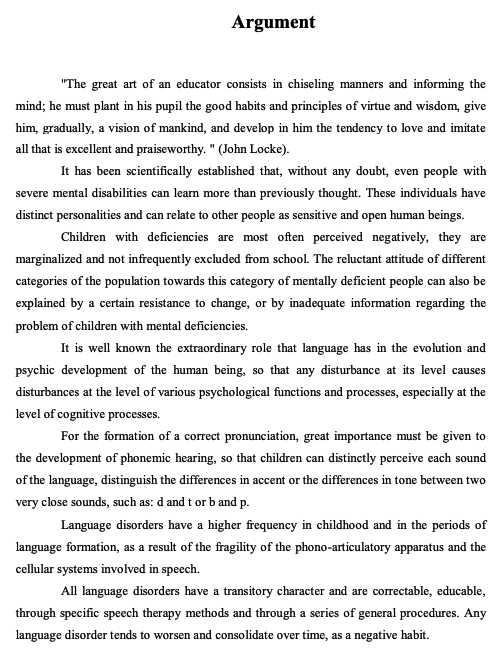Speech Therapy for Mentally Deficient Children
Summary:
This note delves into the specialized field of speech therapy tailored for children with mental deficiencies, providing a comprehensive understanding of this critical area.
In Part I, the theoretical foundation is laid out, starting with Chapter 1, which tackles the universe of mental deficiency. It explores the concept of mental deficiency (1.1.1) and its classification (1.1.2), delving into the etiology (1.2) and typology (1.3) of mental deficiency, categorizing it into different degrees (1.3.1, 1.3.2, 1.3.3, 1.3.4).
Chapter 2 shifts the focus to language disorders, discussing their etiology (2.1) and classification (2.2), which includes pronunciation, rhythm, fluency, voice, reading-writing, and developmental disorders. It also discusses the methods and procedures for correcting language disorders (2.3).
Chapter 3 delves into the peculiarities of language in individuals with mental deficiencies, offering insights into how their cognitive challenges impact their communication skills.
Chapter 4, the core of the note, delves into the specific characteristics of speech therapy designed for children with mental deficiencies. This section provides valuable guidance and strategies for professionals in this field, highlighting the unique challenges and considerations when addressing speech and language issues in these individuals.
Part II introduces the investigative study, detailing the research methods and findings, while Part III-A focuses on data presentation, processing, and interpretation.
The note summarises key findings and insights drawn from the research in Part IV. It also presents proposals and recommendations for improving speech therapy practices for children with mental deficiencies.
The note draws from a rich bibliography to support its content, ensuring a well-informed and evidence-based approach to speech therapy for this specific population.
Annexes provide additional reference materials and data, enhancing the comprehensiveness of the note.
Excerpt:
Speech Therapy for Mentally Deficient Children
Argument
“The great art of an educator consists in chiselling manners and informing the mind; he must plant in his pupil the good habits and principles of virtue and wisdom, give him, gradually, a vision of mankind, and develop in him the tendency to love and imitate all that is excellent and praiseworthy” (John Locke).
It has been scientifically established that, without any doubt, even people with severe mental disabilities can learn more than previously thought.


Reviews